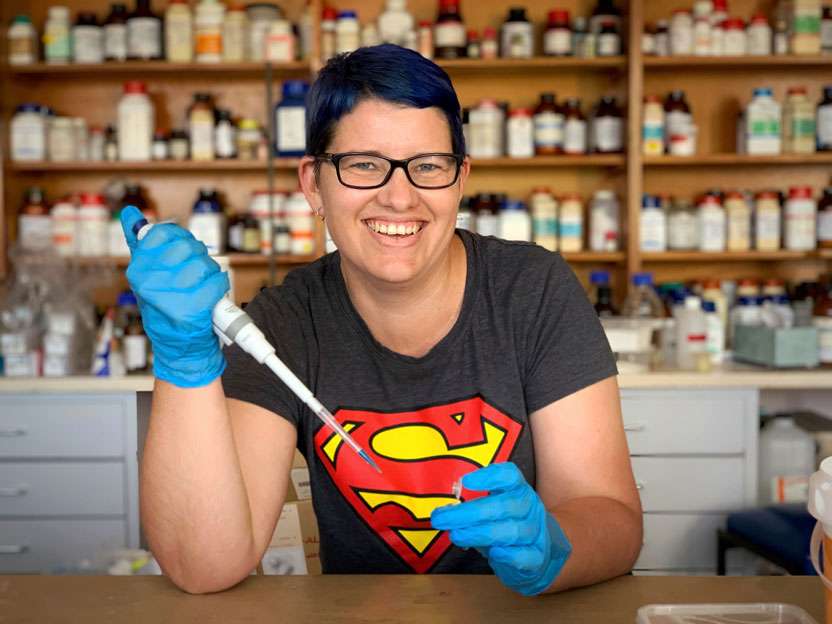

In February (which now seems like a lifetime ago), I was one of around 400 delegates converging on Adelaide to attend the Catalysing Gender Equity 2020 conference. A collaboration between the Australian Academy of Science and Science in Australia Gender Equity (SAGE), the aim of the conference was to bring together representatives from research, industry, higher education and government for two days of discussion and workshops on progressing and implementing the recommendations from the Women in STEM Decadal Plan.
Given my interest in diversity and inclusion, and some of the work I’ve done in supporting and promoting women and girls in STEM, I was keen to take part. However, getting to these kinds of events can be tough—travelling from regional Australia is costly, and like so many EMCRs I’m not rolling in barrels of money. In this case I was fortunate enough to be selected as one of twelve STEM Women Changemakers by the Australian Academy of Science, who were supported to attend the conference through the generous donation from Professor Michelle Coote through her Georgina Sweet Fellowship (thanks Michelle!).
The first challenge of the conference (after finding good coffee, of course) was choosing which workshops to attend. Topics included education, changing workplace culture, creating greater visibility, demonstrating leadership in gender equity and evaluation of equity programs. Spoilt for choice, one of my highlights was a workshop on connecting girls with STEM careers, which focused on how we can build more gender inclusive learning environments. Seemingly simple actions, like the language we use, or the examples that we highlight, can have a big impact in terms of making girls feel included.
Another session I attended was on the importance of mentoring to career development. I was surprised to hear from a large proportion of the audience that they hadn’t had ordidn’t have a mentor. For me, mentors have had a huge influence in my life and career, so my advice (echoing that of the presenters) is to find a mentor. We also had some discussion about the value of sponsors versus mentors—while a mentor might advise you which doors to look at, a sponsor will help you to open that door. So even better, find a sponsor!
Mentors have had a huge influence in my life and career, so my advice…is to find a mentor
The busy conference schedule included a number of interesting keynotes and panel discussions. I particularly appreciated hearing from Professor Lisa Harvey-Smith, Australia’s Women in STEM ambassador, as she talked about the idea that change is a verb—and that if we want things to change, we have to DO something. There needs to be sustained action, and that work needs to be shared and evaluated. This talk, I think, resonated for many of us in the room, who have heard plans and strategies talked about, but not always seen meaningful action come from them. As they say, talk is cheap…
Working at a university that has not (at least yet) become involved with the Athena SWAN program, I found it interesting to hear from others about their experiences in implementing and evaluating the program (and the awards dinner was pretty swish too). I got some great advice and insight from those who had been program managers at their institutions, and this will be valuable to take back to my workplace should we be looking in that direction in the future. Interesting to note that so many of the individuals and teams involved in the program were women—and that many felt that a lot of the work they’ve done was not valued as highly as it could be. Something to keep an eye on with any initiatives hoping to tackle big issues, whether it be gender equity or anything else.
For me, one of the less glossy aspects of the conference was the focus on women (yes, I get that it was a gender equity conference) without broader acknowledgement of intersectionality. I worry that for many organisations taking action around diversity and inclusion falls into a ’women-first’ approach, ignoring that overlapping systems of disadvantage exist. Whereas by focusing on intersectionality, we could better solve the systemic problems that exist within STEM. There was some robust Twitter conversation on the topic throughout the conferenceso if you missed it check out the #CGE2020 tag.
A personal highlight of the conference for me was meeting the other 11 STEM Women Changemakers and hearing some of them tell more of their stories in one of the discussion panels. We bonded over the fact that nearly all of us, on being selected, had immediately felt the bite of imposter syndrome, questioning whether we belonged in the group. Getting past that, I think we’re now all looking forward to how we can use our new network and collaborate going forward. So, thank you again to the Australian Academy of Science and Professor Michelle Coote for bringing us together for the conference and beyond.
© 2025 Australian Academy of Science